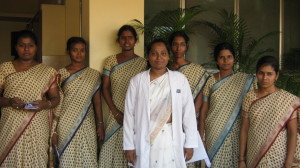By Laura Costica, Research Associate – ICTPH

Imagine an elderly man who walks into a primary care unit seeking treatment; his old age hampers his ability to remember past medical experiences, restricting the information the healthcare professional can use to make an informed judgement about this condition. Now, what if the patient’s medical profile were just a click away? Appropriate care could be delivered much quicker and far more accurately.
Integral to ICTPH’s strategy for delivering healthcare services, technology tools such as Electronic Health Records (EHR) seek to empower medical professionals to make quick and accurate decisions, thus introducing quality standards across Rural Micro Health Centres (RMHCs). Furthermore, by collecting patients’ medical records in digital formats, the system enables analysis of disease prevalence in a given geographical area; this in turn facilitates the creation of tailored preventive/promotive care interventions. Our strong belief is that a good public health system should be more than just a fire fighting mechanism that treats the sick, but rather be able to anticipate that spark that lit up the fire in the first place, hindering its occurrence.
In line with this vision, ICTPH, in partnership with Swasth India, is developing an in-house EHR system that caters to the challenged posed by service delivery at the primary care level. The information it captures offers a comprehensive view of patients’ health status, spanning their family history, own illness history, past immunisations, anthropometric measures etc, as well as details of out-patient visits at the RMHC. The visit flow is guided through the SOAP consultation process, which uses a standard structure using Subjective, Objective, Assessment, and Planning (SOAP) information. This allows the healthcare professional to navigate through the different stages that lead to a diagnosis, prompting her to ask for all relevant information related to the patient’s health status.
The EHR is central to ICTPH’s new clinic launch in Karambayam, which is scheduled for September 2010, where trained Community Health Workers will collect data on each individual’s medical profile, as well as apply a screening package that facilitates early detection of diseases. Feeding this data into the EHR will enable the allotment of individuals into high/medium/low risk categories, thus enabling the prioritization of those most in need of healthcare services.
The plan to introduce Electronic Health Records in rural primary clinics is ambitious, but ICTPH is no dreamer, realising that the path ahead is a long and bumpy one. The list of challenges includes building the capacity of RMHC staff to utilise the new technology, changing health staff’s mentality that healthcare is restricted to curative care, streamlining consultation processes so that quality care is delivered every time, despite different levels of training amongst health staff, etc.


Leave a Reply
2 Comments on "How Electronic Health Records Can Enhance the Quality of Health Services Delivery"
This is remarkable.This path-breaking effort by ICTPH will bring in the much needed early detection and preventive health care to the rural folk who have all along been denied this. Hearty congratulations. I am sure you will be able achieve new bench mark in health care.
Hello sir! Thanks so much for your encouragement, it’s really heartening to hear this when we’re still at the beginning of the road.